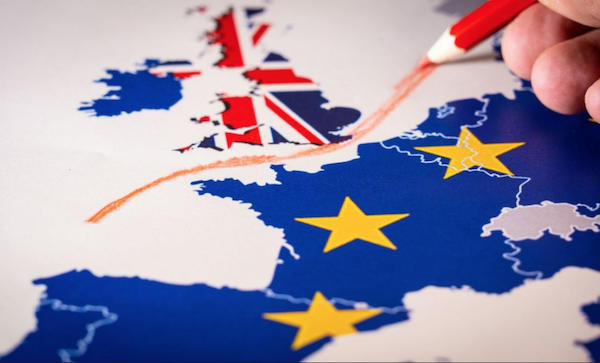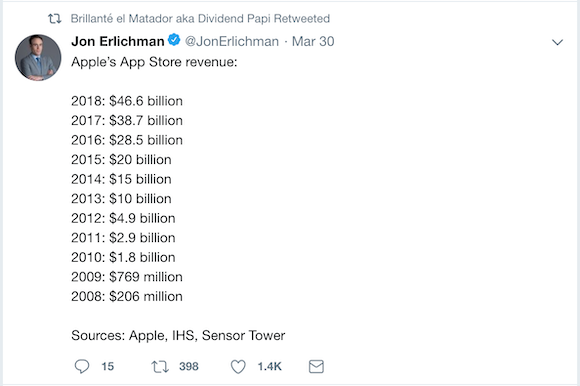Market Scorecard
It was another cracker of a day on global markets yesterday. Everything that came across the wire was talking about why stocks are going to go higher; low-interest rates, improved PMI in China, the nearing of a trade deal and how good Q1 2019 was. The point we make to clients all the time is that in a matter of a few days, the focal point of the market can completely shift.
The mood is currently positive, so everything is seen through rose-tinted glasses. When the market slides, investors are gloomy and the negatives take centre stage.
Yesterday the
JSE All-share closed up 1.34%, the
S&P 500 closed up 0.21%, and the
Nasdaq closed up 0.60%.
Our 10c Worth
One thing, from Paul
Financial services are a big part of the modern economy, but
are banks a good investment? They're certainly profitable, and these days very unlikely to fail, but mostly unloved. What this means is that they churn out cash, but their share prices trade at modest multiples of current earnings.
To some extent
bank share prices move around with interest rates. The general view is that when interest rates are rising they make more money, as they charge their customers (people who borrow to buy houses, cars, and things on their overdrafts and credit cards) more, but delay paying their depositors' extra interest.
Large bank stocks in the US market (we own
JP Morgan) have underperformed the S&P 500 sharply in recent weeks due to a decline in forward interest rate expectations. The Fed was talking about multiple rate hikes in 2019, and then it changed its mind. In the long run what matters more is benign credit conditions. In other words, people doing well and not defaulting on their loans. Finally, banks lend to businesses, so they do well when the economy is expanding and there are lots of mergers and acquisitions going on.
Here in South Africa credit conditions are slack and confidence is low. Hopefully sentiment levels will perk up if the election goes off well in May.
Firstrand is attractive, and so is
Discovery. Capitec continues to do well, but is probably fully valued.
One more thought. All banks are becoming more efficient. If all goes well, another earnings kicker in years to come will be the greater use of technology and online channels to lower costs. The cheque book pictured below is a thing of the past.

Byron's Beats
Yesterday Aspen soared nearly 6%. I commented in the office that there must be some progress with the Formula Business sale. I soon found this article from Bloomberg titled
Aspen Is Said to Get Approvals for Baby-Milk Deal.
It is one of those articles where people "close to the matter who may not be named" are quoted which always makes me sceptical. But it is a good time to remind you what exactly is going on here.
Aspen has too much debt and is relying on the sale of their Formula business, which is estimated to raise R10.4bn. Current debt sits at R53.5bn so this will go a long way to reducing that number.
The hold up is coming from New Zealand. A foreign company needs approval to operate there. Aspen had this approval but the purchasing company does not. Lactalis is French and has never operated in New Zealand before.
There is no reason why they shouldn't get the approval, the company had revenues of 16.5bn Euros a few years back. This is a well established business with an 86 year history.
But, there is always a risk and this has put an overhang on Aspen and that is why the share price has been volatile.
Michael's Musings
Last night the UK parliament voted, by 1 vote, to not have a no deal Brexit. From here the bill will go to the House of Lords, where it is expected to pass as well. Any extension deal that the UK negotiates with the EU now can't include the possibility of a no deal Brexit. This means that
the UK will more than likely be part of the upcoming EU parliament elections. If you are not sure what or how those work, here is a 2-minute 58-second video explaining it -
European elections: How it works?.
As you can imagine, this makes some people in the EU grumpy.
Why should the UK be part of EU elections, send all their delegates to Brussels, vote on the next EU president, only to leave in a couple of months? The current reports I'm reading says that there will be a 'gentleman's agreement' with the UK where their members will abstain from significant and long-term EU policy votes. If the UK does abstain now but decides then to revoke article 50 and stay in the EU, they will be missing out on forming EU policy. It is all very messy.
Next week Friday is the hard deadline for the UK to decide what they want to do. Unofficially next week Wednesday is the deadline because that is when the UK and EU will be meeting to discuss their futures.
A week is a very long time in politics, so expect a volatile Pound, and some very entertaining reality TV.

Bright's Banter
Ten years ago on the 7th of October, Spotify launched its music streaming services with just a Euro and a dream. A year before that, music streaming was in its infancy with approximately one percent of global music revenues. CDs accounted for nearly 80 percent of global music revenues. CDs right; like imagine me having to explain what a CD is to my future child.
Fast-forward to today, according to
IFPI, music streaming accounted for approximately 40 percent of global music revenues and 65 percent in the US, up from less than 10 percent in 2011. The year 2017 was a pivotal year in music because this was the year where the valkyries came for downloaded music and streaming became the more sensible option for consumers. Why were we downloading single albums for R90 when a R60 subscription gets us unlimited albums from a variety of artist?
In 2018, worldwide recorded music revenues crested $19.1 billion, up 9.7% as compared to $17.4 billion the previous year. Felix Richter of Statista wrote
"this marks the fourth consecutive year of growth for the global music industry after nearly two decades of gradual decline."
Professor Scott Galloway said the following in the most recent episode of his podcast, Pivot, with Kara Swisher:
"Effectively if you look at Spotify and why everyone should listen to it 24/7. The problem is that for every dollar you spend on Spotify, they spend a dollar thirty on the artists' royalties. Michael Bolton is used to the good old days and there's basically three or four record labels that control everything. They have cartel power and pricing power. So the move to podcasting made sense!"
The infographic below shows how streaming has basically saved the music industry, as the phoenix rises from the ashes. Thank you Spotify, very cool!

You will find more infographics at
Statista
Linkfest, Lap it Up
A fun fact about the Matrix movie, which turns 20 this year -
The Matrix code came from sushi recipes.
 The internet has already been life changing
The internet has already been life changing, 5G will take it to a whole new level.

You will find more infographics at
Statista
Vestact Out and About
Michael gets a quote in the Business Day, talking about the potential listing of Jumina next week -
MTN's Jumia prepares for New York listing.

 Signing off
Signing off
The JSE All-share is lower this morning. British American Tobacco is down 1.5% due to a report showing that US tobacco sales were down 9% in March, continuing the trend where sales were down 5.3% in 2018. Later today there is data out about South African electricity production and consumption.
Sent to you by Team Vestact.


 You will find more infographics at Statista
You will find more infographics at Statista

 You will find more infographics at Statista
You will find more infographics at Statista

